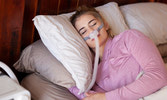Have you ever wondered how sleep-related conditions are diagnosed? Sleep studies are commonly used to help diagnose various sleep-related conditions including sleep apnea. Today, we’ll dive into the world of sleep studies and how they can be used to help individuals struggling with sleep-related conditions get better quality sleep!
What Is a Sleep Study?
A sleep study, also known as a polysomnogram, is a common diagnostic test that helps diagnose many sleep-related conditions. This is a non-invasive, painless test, typically done overnight. During a sleep study, specialized sensors are used to monitor different symptoms in the body such as brain activity, heart rate, eye movements, and oxygen levels throughout the night. Most sleep studies are conducted in laboratory facilities.
Conditions That a Sleep Study Can Diagnose
Sleep studies are an extremely helpful tool in diagnosing the following conditions:
- Obstructive and Central Sleep Apnea
- Narcolepsy
- Insomnia
- REM Sleep Behavioral Disorder
- Restless Leg Syndrome
- Sleep Terrors
- Periodic Limb Movement Disorder
- Other Sleep-Related Conditions
How to Prepare for a Sleep Study
Avoid consuming caffeine, alcohol, and large meals before your test to ensure maximum effectiveness of your sleep study. You will usually want to schedule your sleep study during a time when you are normally sleeping and be sure to wear something you are comfortable sleeping in. Pack all the necessary toiletries and medications you will need for the night. Some providers will tell you to avoid using certain lotions or hair sprays before your appointment as it can impact the way that the sensors can effectively stick to your skin.
What Happens After a Sleep Study?
After a sleep study is completed, the patient will go home, and a sleep specialist will review the results. A sleep study provides the necessary information needed for the patient to receive a correct diagnosis and treatment plan, if needed. There are many forms of treatment for sleep-related conditions, including CPAP (Continuous Positive Airway Pressure) therapy, medications, surgery, and more. Your provider can talk you through all your treatment options if necessary and help you get closer to getting the quality sleep you’ve been searching for.
Overall, sleep studies are extremely useful when diagnosing sleep-related conditions. With these helpful insights, you can now better understand what sleep studies are and how they can be beneficial for individuals struggling to get quality sleep. At the Advanced Respiratory Care Network, we provide sleep diagnostics and treatment services. For more information, please visit our website or contact our team.

